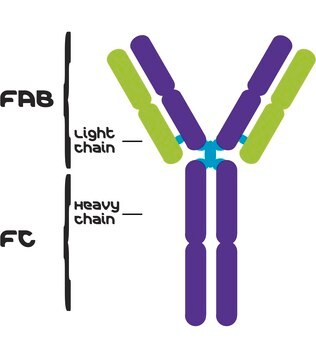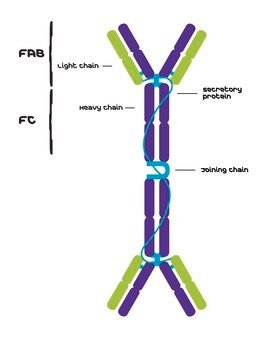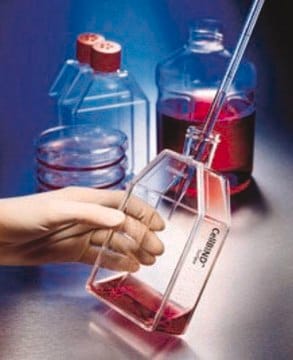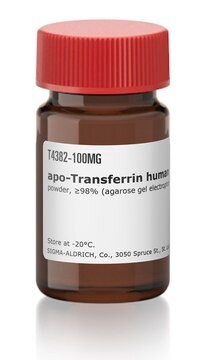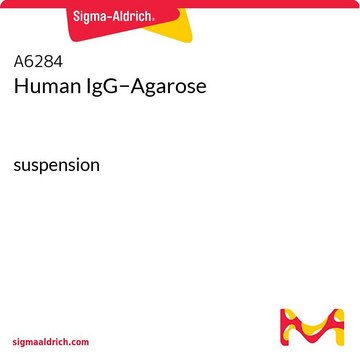A2691
Anti-Human IgA (α-chain specific)−Agarose antibody produced in goat
affinity isolated antibody, adsorbed with mouse and rat IgG
Synonyme(s) :
Goat Anti-Human IgA
Se connecterpour consulter vos tarifs contractuels et ceux de votre entreprise/organisme
About This Item
Produits recommandés
Source biologique
goat
Conjugué
agarose conjugate
Forme d'anticorps
affinity isolated antibody
Type de produit anticorps
secondary antibodies
Clone
polyclonal
Forme
PBS suspension
Espèces réactives
human
Ne doit pas réagir avec
rat, mouse
Capacité
3-4 mg/mL binding capacity (human IgA)
Température de stockage
2-8°C
Modification post-traductionnelle de la cible
unmodified
Description générale
Binding Capacity: One mL of antibody binds 3-4 mg human IgA. Elution Capacity is 2-4 mg/mL.
IgA antibody plays an essential role in mucosal immunity. It has shown to bind immunogens/pathogens to restrict them from entering the mucosal membrane. The Anti-Human IgA (α-chain specific) product increases sensitivity to human IgA without cross-reactivity to other substances. Offering minimal interspecies cross reactivity to mouse or a rat, making it ideal for use in screening antibodies produced by a hybridoma cells containing a mouse or a rat immunoglobulins.
Immunogène
IgA produced from transformed cell line of human Epstein-Barr virus.
Application
Affinity chromatography using anti-human IgA antibody linked to agarose was performed to purify proteins from 2E9IgA1 transfectant cells.
Anti-Human IgA (α-chain specific)-Agarose antibody produced in goat has been used in affinity chromatography and quantitative enzyme linked immunosorbent assay (ELISA).
Forme physique
Suspension in 0.01 M phosphate buffered saline, pH 7.4, containing 15 mM sodium azide
Clause de non-responsabilité
Unless otherwise stated in our catalog or other company documentation accompanying the product(s), our products are intended for research use only and are not to be used for any other purpose, which includes but is not limited to, unauthorized commercial uses, in vitro diagnostic uses, ex vivo or in vivo therapeutic uses or any type of consumption or application to humans or animals.
Vous ne trouvez pas le bon produit ?
Essayez notre Outil de sélection de produits.
Code de la classe de stockage
10 - Combustible liquids
Classe de danger pour l'eau (WGK)
WGK 3
Point d'éclair (°F)
Not applicable
Point d'éclair (°C)
Not applicable
Faites votre choix parmi les versions les plus récentes :
Déjà en possession de ce produit ?
Retrouvez la documentation relative aux produits que vous avez récemment achetés dans la Bibliothèque de documents.
Susanne Wolbank et al.
Journal of virology, 77(7), 4095-4103 (2003-03-14)
We have previously generated human monoclonal anti-human immunodeficiency virus type 1 (anti-HIV-1) antibodies 2F5IgG and 2G12IgG with an exceptional cross-clade neutralizing potential. 2F5IgG and 2G12IgG passively administrated to macaques were able to confer complete protection from both intravenous and mucosal
Poor ex vivo induction of T-cell responses to idiotype or tumor cell lysate-pulsed autologous dendritic cells in advanced pre-treated multiple myeloma
Garderet L, et al.
Leukemia & Lymphoma, 47(7), 1340-1347 (2006)
Suckow MA, et al.
The Laboratory Rat (2005)
Y J Wen et al.
Blood, 97(6), 1750-1755 (2001-03-10)
Multiple myeloma (MM) is a B-cell malignancy. The monoclonal immunoglobulin, secreted by myeloma plasma cells, carries unique antigenic determinants (idiotype [Id]) that can be regarded as a tumor-specific antigen. Id-based immunotherapy has been explored in myeloma patients for the purpose
J Berdoz et al.
Proceedings of the National Academy of Sciences of the United States of America, 96(6), 3029-3034 (1999-03-17)
The hallmark of a mucosal immune response is the production of antigen-specific secretory IgA (S-IgA) antibodies in external secretions. S-IgA consists of ten polypeptides produced in two different cell lineages. The heavy and light chains in plasma cells assemble into
Notre équipe de scientifiques dispose d'une expérience dans tous les secteurs de la recherche, notamment en sciences de la vie, science des matériaux, synthèse chimique, chromatographie, analyse et dans de nombreux autres domaines..
Contacter notre Service technique
